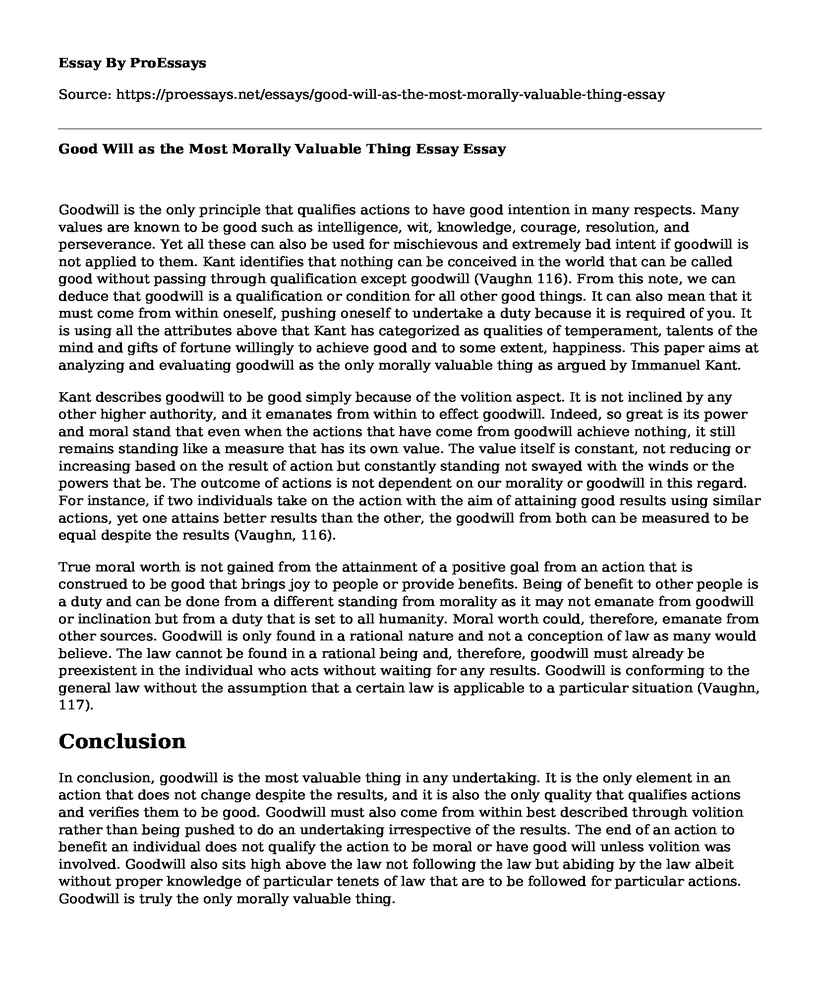Goodwill is the only principle that qualifies actions to have good intention in many respects. Many values are known to be good such as intelligence, wit, knowledge, courage, resolution, and perseverance. Yet all these can also be used for mischievous and extremely bad intent if goodwill is not applied to them. Kant identifies that nothing can be conceived in the world that can be called good without passing through qualification except goodwill (Vaughn 116). From this note, we can deduce that goodwill is a qualification or condition for all other good things. It can also mean that it must come from within oneself, pushing oneself to undertake a duty because it is required of you. It is using all the attributes above that Kant has categorized as qualities of temperament, talents of the mind and gifts of fortune willingly to achieve good and to some extent, happiness. This paper aims at analyzing and evaluating goodwill as the only morally valuable thing as argued by Immanuel Kant.
Kant describes goodwill to be good simply because of the volition aspect. It is not inclined by any other higher authority, and it emanates from within to effect goodwill. Indeed, so great is its power and moral stand that even when the actions that have come from goodwill achieve nothing, it still remains standing like a measure that has its own value. The value itself is constant, not reducing or increasing based on the result of action but constantly standing not swayed with the winds or the powers that be. The outcome of actions is not dependent on our morality or goodwill in this regard. For instance, if two individuals take on the action with the aim of attaining good results using similar actions, yet one attains better results than the other, the goodwill from both can be measured to be equal despite the results (Vaughn, 116).
True moral worth is not gained from the attainment of a positive goal from an action that is construed to be good that brings joy to people or provide benefits. Being of benefit to other people is a duty and can be done from a different standing from morality as it may not emanate from goodwill or inclination but from a duty that is set to all humanity. Moral worth could, therefore, emanate from other sources. Goodwill is only found in a rational nature and not a conception of law as many would believe. The law cannot be found in a rational being and, therefore, goodwill must already be preexistent in the individual who acts without waiting for any results. Goodwill is conforming to the general law without the assumption that a certain law is applicable to a particular situation (Vaughn, 117).
Conclusion
In conclusion, goodwill is the most valuable thing in any undertaking. It is the only element in an action that does not change despite the results, and it is also the only quality that qualifies actions and verifies them to be good. Goodwill must also come from within best described through volition rather than being pushed to do an undertaking irrespective of the results. The end of an action to benefit an individual does not qualify the action to be moral or have good will unless volition was involved. Goodwill also sits high above the law not following the law but abiding by the law albeit without proper knowledge of particular tenets of law that are to be followed for particular actions. Goodwill is truly the only morally valuable thing.
Works Cited
Vaughn, Lewis. Doing Ethics: Moral Reasoning, Theory, and Contemporary Issues. 4th ed., W. W. Norton & Company, 2016.
Cite this page
Good Will as the Most Morally Valuable Thing Essay. (2022, Sep 18). Retrieved from https://proessays.net/essays/good-will-as-the-most-morally-valuable-thing-essay
If you are the original author of this essay and no longer wish to have it published on the ProEssays website, please click below to request its removal:
- Aristotelian Virtue Theory Essay
- Contemporary and International Issues in Business Ethics
- Essay Sample on NCAA Ethics and Compliance Program
- Christian Counseling Ethics: God's Standpoint vs. ACA's Pragmatism - Essay Sample
- Identity Shaping: Social, Genetic, Cultural, and Built Environment - Essay Sample
- Ethical Issues in Psychological Research - Essay Sample
- Essay Sample on Virtuous Character According to Aristotle







